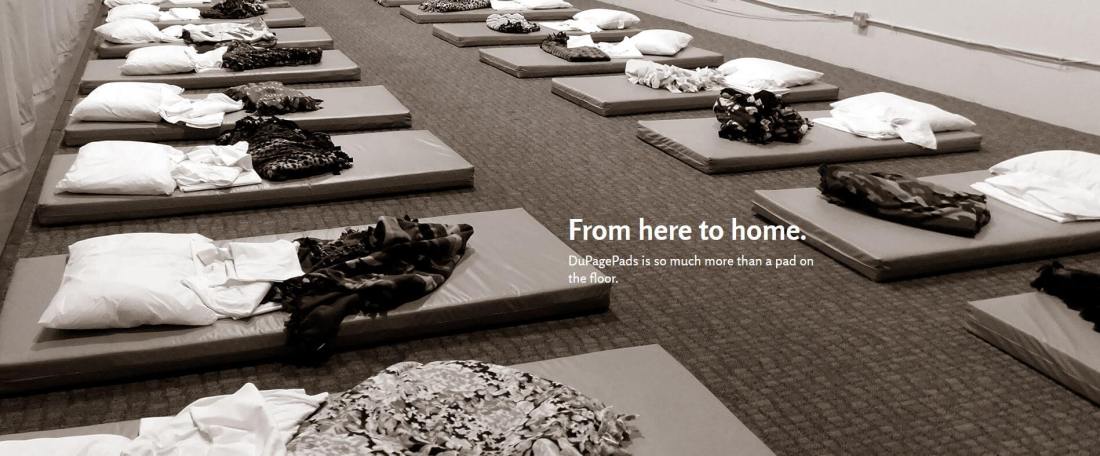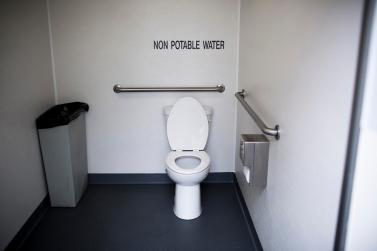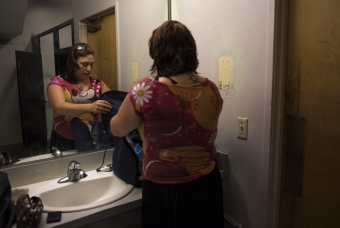The following sermon was preached at Redeemer Lutheran Church in Hinsdale, IL in connection with their “Renewing Redeemer” capital campaign.
Texts: Acts 4:5-12 + Psalm 23 + 1 John 3:16-24 + John 10:11-18
Grace and peace be with you in the name of God’s beloved, Jesus the Christ, risen from the dead. Alleluia!
I am so happy to be with you this morning as we continue to worship in the joy of the Easter season, to rejoice in God’s power to bring new life to people and places left for dead. In my call as Pastor to the Community and Director of Worship at the Lutheran School of Theology at Chicago I am given opportunities to proclaim this divine reality on a daily basis, especially right about how as our students wonder how they will ever get through to the end of the semester (which ends in three weeks) alive.
So, before I really begin and on behalf of not only LSTC but also the wider church, let me also thank you for your partnership in the ministry we share of preparing a new generation of rostered leaders for church and society. You have been a training ground for former students like Pastor Marcus Lohrmann who, along with his wife the Rev. Bekki Lohrmann, now serves the church at Holden Village in Washington state. In this way we are reminded that we are all connected to each other, we abide with one another, in ways we cannot always see and do not always remember.

When Pastor Katie invited me to preach this morning, it was with the “Renewing Redeemer” capital campaign in mind, and specifically to encourage you as you “imagine Renewing Redeemer for those in need.” She shared with me the good work you have been doing in partnership with DuPage PADS, and let me know that one of the goals of the capital campaign was to modernize your facilities so that you can more hospitably host people and families experiencing homelessness. I was so glad to hear that as, before entering seminary, I’d worked with runaway, homeless, and street-dependent youth in Minneapolis, Atlanta, and in a number of cities along the eastern seaboard as an outreach counselor and community organizer. In fact, one of the things that drove me to seminary nearly twenty years ago was my concern that the church was too absent in the lives of youth and families who did not conform to the culture and customs that govern most of our congregations. I wanted to know what the church had to say to those who were living with their backs to the wall — more than that, I wanted to know how what the church said was connected to what the church was willing to do.
 This is why I am so glad to know that part of your capital campaign is directed toward upgrades to — of all things — your restroom facilities. No joke! As someone who has spent time with homeless kids on the street, I can say from first hand experience how important accessible bathrooms are! Not just accessible in the sense of being accessible to people of different physical abilities (though that is obviously important) or accessible in the sense of being open to the public (though that is also critical), but accessible in the sense of being constructed, maintained, and operated in such a way that it is clear that not only the basic needs but also the basic dignity of the people who will use these facilities has been considered.
This is why I am so glad to know that part of your capital campaign is directed toward upgrades to — of all things — your restroom facilities. No joke! As someone who has spent time with homeless kids on the street, I can say from first hand experience how important accessible bathrooms are! Not just accessible in the sense of being accessible to people of different physical abilities (though that is obviously important) or accessible in the sense of being open to the public (though that is also critical), but accessible in the sense of being constructed, maintained, and operated in such a way that it is clear that not only the basic needs but also the basic dignity of the people who will use these facilities has been considered.
 Prior to my current call to the seminary in Hyde Park, I served as the pastor with St. Luke’s Lutheran Church of Logan Square on Chicago’s north side. The building we occupied for most of my time there was a massive, neo-Gothic cathedral style edifice built in phases between 1900 and 1954. In its prime, it was home to hundreds of families and daily programming. By the time I arrived in 2006 it had dwindled considerably after the neighborhood fell on hard times. Still, the stalwart members of St. Luke’s continued to love and serve their neighbors, mainly through the ministry of Elijah’s Pantry, a hunger ministry carried out in conjunction with the Greater Chicago Food Depository. Twice a week, every week, hundreds of hungry people would come through our doors for groceries they relied on to feed their families. Some were taking these groceries home to cook. Others had no homes, and were taking them to the squats where they slept under the interstate or the alleys where they spent their days.
Prior to my current call to the seminary in Hyde Park, I served as the pastor with St. Luke’s Lutheran Church of Logan Square on Chicago’s north side. The building we occupied for most of my time there was a massive, neo-Gothic cathedral style edifice built in phases between 1900 and 1954. In its prime, it was home to hundreds of families and daily programming. By the time I arrived in 2006 it had dwindled considerably after the neighborhood fell on hard times. Still, the stalwart members of St. Luke’s continued to love and serve their neighbors, mainly through the ministry of Elijah’s Pantry, a hunger ministry carried out in conjunction with the Greater Chicago Food Depository. Twice a week, every week, hundreds of hungry people would come through our doors for groceries they relied on to feed their families. Some were taking these groceries home to cook. Others had no homes, and were taking them to the squats where they slept under the interstate or the alleys where they spent their days.
 This meant that our bathrooms were not only bathrooms, they were make-shift showers and places for people to rinse out their underwear and their socks. It also meant that we went through toilet paper at an alarmingly fast rate. So fast that it seemed obvious to anyone paying attention that rolls of toilet paper were being taken by our guests. Understandably, this was frustrating to the pantry volunteers who didn’t enjoy being called into the bathroom every hour to replace the toilet paper. Which meant that I, also, heard more about toilet paper and toilets that I’d ever cared to — which might also be how you’re feeling right about now. If so, I understand, but bear with me.
This meant that our bathrooms were not only bathrooms, they were make-shift showers and places for people to rinse out their underwear and their socks. It also meant that we went through toilet paper at an alarmingly fast rate. So fast that it seemed obvious to anyone paying attention that rolls of toilet paper were being taken by our guests. Understandably, this was frustrating to the pantry volunteers who didn’t enjoy being called into the bathroom every hour to replace the toilet paper. Which meant that I, also, heard more about toilet paper and toilets that I’d ever cared to — which might also be how you’re feeling right about now. If so, I understand, but bear with me.
One day, after being approached by a volunteer yet again with complaints about missing toilet paper, I finally snapped. In a moment of frustration I climbed up on my soap box and said something to the effect of,
“I am so sick of hearing about toilet paper! I don’t ever need to hear another conversation about the state of our bathrooms. As long as I’ve been here, people have been complaining to me about the embarrassing state of our bathrooms. Lots of people use our bathrooms. Lots of homeless and hungry people use our bathrooms. People take baths in our sinks. People steal our toilet paper. What am I supposed to do about that? Honestly, if money is so tight that people are choosing between buying food and buying toilet paper, I hope they’re buying the food. I can’t get mad at someone for doing what they have to do to make sure they can clean up after themselves! What can I say? I am no toilet expert. The Bible doesn’t have lots of practical advice to offer about toilets, so your idea is as good as mine.”
This, however, was not the end of it. In an effort to have a better answer than the one that had spilled out to this volunteer, I ended up doing a little research in preparation for a sermon on the topic of toilets which, to this day, remains one of the most read and shared of all the sermons I’ve posted online. Go figure.
That’s how I came across an essay entitled, “Learning from the Loo,” in which American sociologist Harvey Molotch writes,
“Whatever the setting or scale of the problem, we have in the toilet an instrument and institution that both reflects how people and societies operate and also reinforces the existing pattern. Precisely because the toilet operates somewhat in hiding, those who plan, manage, and control its use often act on their own, without a public to which they must provide detailed and explicit accounts of what they are doing. The toilet thus operates irresponsibly. Compared to other artifacts, arrangements, and patterns of usage, it thus resists change — however unjust, damaging, or inefficient things may be.”
To speak plainly, this means that the condition of our restrooms both means something and does something. What it means is related to difference and how we view people whose life circumstances are different from our own. The accommodations we expect for ourselves as opposed to the ones we make available to others. What it does is actually maintain and reinforce our prejudices about those differences. The person who has to use public restrooms because they don’t have access to any others isn’t invited into a meditation on class, poverty, and human dignity. They are experiencing classism, power and indignity. Whether that is what we intend or not is beside the point.
This is why it’s actually quite important that you have given careful thought to the facilities you currently provide to guests who come to Redeemer through the PADS ministry, and even more important that you are imagining the difference it will make once you have made the necessary improvements so that these guests — who are actually more than guests, who in fact are fellow bearers of the image of God, and our siblings in the wider human family — can experience within these walls, the house of God, the kind of homecoming and hospitality they both desperately need and ought to expect.

At the seminary right now, we are in the process of establishing a new partnership with Chicago Cares, an organization you may know works to support people across the Chicagoland area looking to make a difference in the lives of their neighbors through the act of volunteering. As I met last week with their Chief Program Officer, Ellen Ray, she shared something that seems relevant to what we’re talking about this morning. She said, “often people get involved in volunteering because they want to make a measurable impact. But after they’ve served a few times at a food pantry, or a homeless shelter, or an after-school program, they start to ask why so many are hungry, or homeless, or unattended. They begin to move from charity to advocacy.”
In the well-known passage from John in which Jesus names himself the good shepherd, he draws a distinction between the shepherd and the hired hand. The hired hand, whose relationship to the sheep is transactional instead of personal, cannot be counted upon when real danger comes creeping around the flock. The shepherd however, the one who knows each sheep by name, lays down their life for the sheep.
Here is my hope and prayer for you, Redeemer: that this capital campaign does all that you hope it will, and more. That in making the necessary and overdue improvements to your facility for the sake of your ministry with and among your neighbors in need, you will deepen your capacity for ministry that is more than transactional, but is truly relational. That in making the improvements you desire for this house of God, you will create a home in which those who are homeless experience a sense of the spaciousness and hospitality the world too often denies them. That you will find yourself drawn ever more deeply into one another’s lives, in truth and in action, which is simply another way of saying in love.
With thanks for your ministry, and all the ministry that is to come.
Amen.